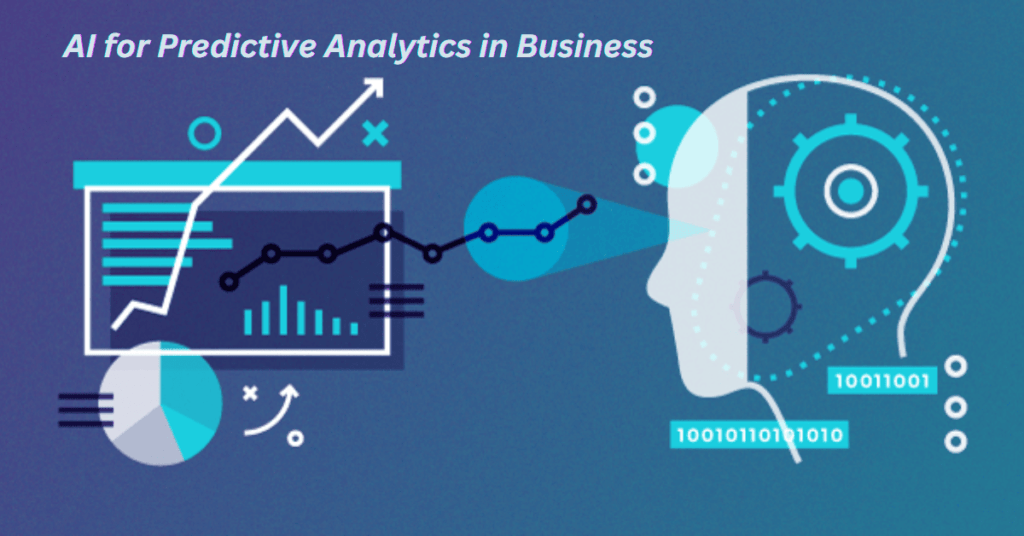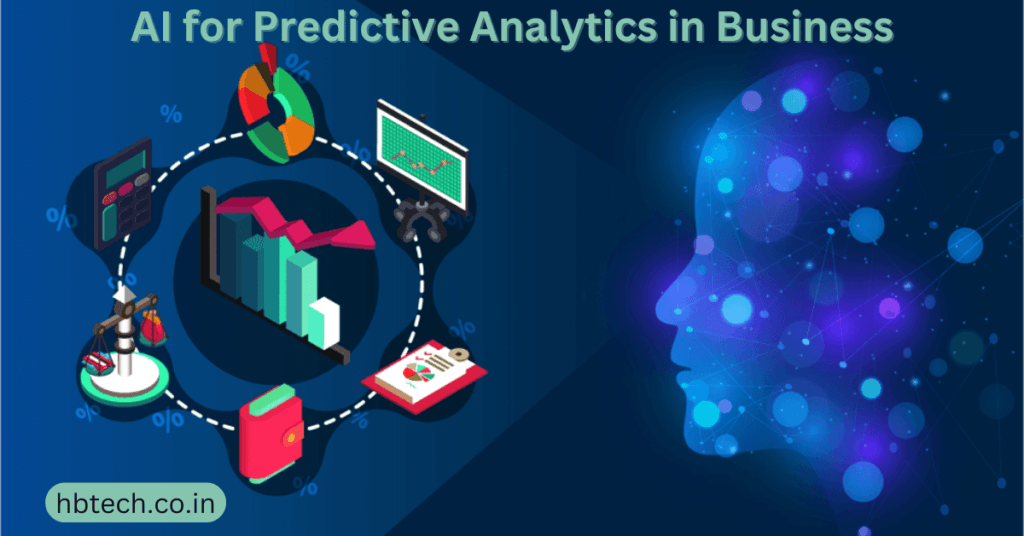In today’s fast-changing business world, companies are always looking for ways to stay ahead. One powerful tool that has transformed decision-making is Artificial Intelligence (AI). Among its many uses, AI for predictive analytics helps businesses make smarter decisions, improve processes and predict future trends.

How AI and Data Analytics Work Together in Business
AI and data analytics are closely connected . Data analytics involves looking at past information to find patterns and trends. Adding AI takes it a step further, allowing businesses to predict what might happen in the future.
Predictive analytics uses AI tools to analyze past data and forecast outcomes. For instance, retailers can predict customer buying habits, manufacturers can spot potential equipment breakdowns and banks can assess loan risks. This helps companies plan better and reduce potential problems.
Business Analytics and Research
Business analytics is about studying data to improve decisions. It includes methods like statistical analysis and predictive modeling. AI makes this process faster and more accurate by handling large amounts of data and delivering insights quickly.
Business research also benefits from AI. Traditional methods of gathering and analyzing market data can be slow and error-prone. AI speeds up these tasks, identifies trends and provides clear recommendations, enabling businesses to make better decisions in less time.
How AI Improves Predictive Analytics
AI has made predictive analytics more advanced with technologies like machine learning (ML) and deep learning. These systems learn from data, adapt to new information and improve predictions over time. Key examples of AI in predictive analytics include :
- Understanding Customer Behavior : Predicting what customers want and creating personalized experiences.
- Improving Supply Chains : Forecasting demand to manage inventory and deliveries effectively.
- Managing Risks : Detecting potential risks or fraud in financial transactions.
Companies Leading in AI Analytics
Many businesses specialize in AI-powered analytics. Well-known companies like IBM, SAS and Salesforce offer tools that integrate AI into data analysis. These tools help businesses use predictive analytics to stay competitive. Newer startups are also introducing innovative AI solutions for specific industries, pushing the field forward.
Benefits of Using AI in Business Analytics
AI transforms business analytics by automating data collection and analysis, reducing errors and speeding up decision-making. For example, AI can predict when machines need maintenance, helping industries avoid costly breakdowns. It can also analyze social media posts or customer reviews to understand public opinion and guide strategies.
AI also makes it easier to analyze unstructured data, such as emails or social media comments, giving businesses a complete view of their operations and customer interactions.
Business Analytics vs Predictive Analytics
Business analytics and predictive analytics are related but different. Business analytics looks at past and current data to make decisions. Predictive analytics uses this data, along with AI, to forecast what might happen in the future.
For example, business analytics might show last year’s sales trends, while predictive analytics can estimate next quarter’s sales. Both are valuable for planning and strategy.
AI vs Analytics
AI and analytics are not the same but work well together. Analytics is about examining data to find insights. AI involves advanced technologies like machine learning that allow systems to learn from data and make better predictions. AI makes analytics more accurate and actionable.
Business Intelligence vs Predictive Analytics
Business intelligence (BI) and predictive analytics serve different purposes. BI focuses on understanding past and current business performance using reports and dashboards. Predictive analytics goes further by using AI to forecast future trends.
For example, BI might show that sales dropped last month, while predictive analytics could help figure out why and predict next month’s sales. Together, they provide a complete view for decision-making.
Final Thoughts
AI for predictive analytics is changing how businesses operate. From improving customer experiences to making operations more efficient, AI helps companies unlock new opportunities and prepare for the future. By using AI-driven insights, businesses can stay competitive and handle uncertainties with confidence.
As AI continues to develop, its role in business analytics will become even more important. Companies that start using AI for predictive analytics today will be better positioned to succeed in a data-driven future.
Frequently Asked Questions(FAQs)
What is predictive analytics, and how does AI enhance it?
Predictive analytics is the process of using historical data to forecast future outcomes. AI enhances predictive analytics by using machine learning and advanced algorithms to improve accuracy, identify patterns, and make real-time predictions.
How do AI and data analytics work together in business?
AI and data analytics complement each other. While data analytics focuses on analyzing past data to uncover trends, AI uses this information to predict future scenarios and provide actionable insights, helping businesses make informed decisions.
What are some examples of AI in predictive analytics?
AI is used in predictive analytics for:
Customer behavior prediction: Understanding and anticipating customer preferences.
Supply chain optimization: Forecasting demand and managing inventory efficiently.
Risk management: Detecting fraud and identifying potential business risks.How do AI-powered analytics tools benefit businesses?
AI-powered analytics tools streamline data processing, provide accurate predictions, and enable real-time insights. They help businesses:
Improve customer experiences
Reduce operational costs
Increase efficiency in decision-makingHow can businesses get started with AI for predictive analytics?
Businesses can start by:
Identifying key areas where predictions can add value
Investing in AI-driven analytics tools
Partnering with AI analytics companies to implement tailored solutions









